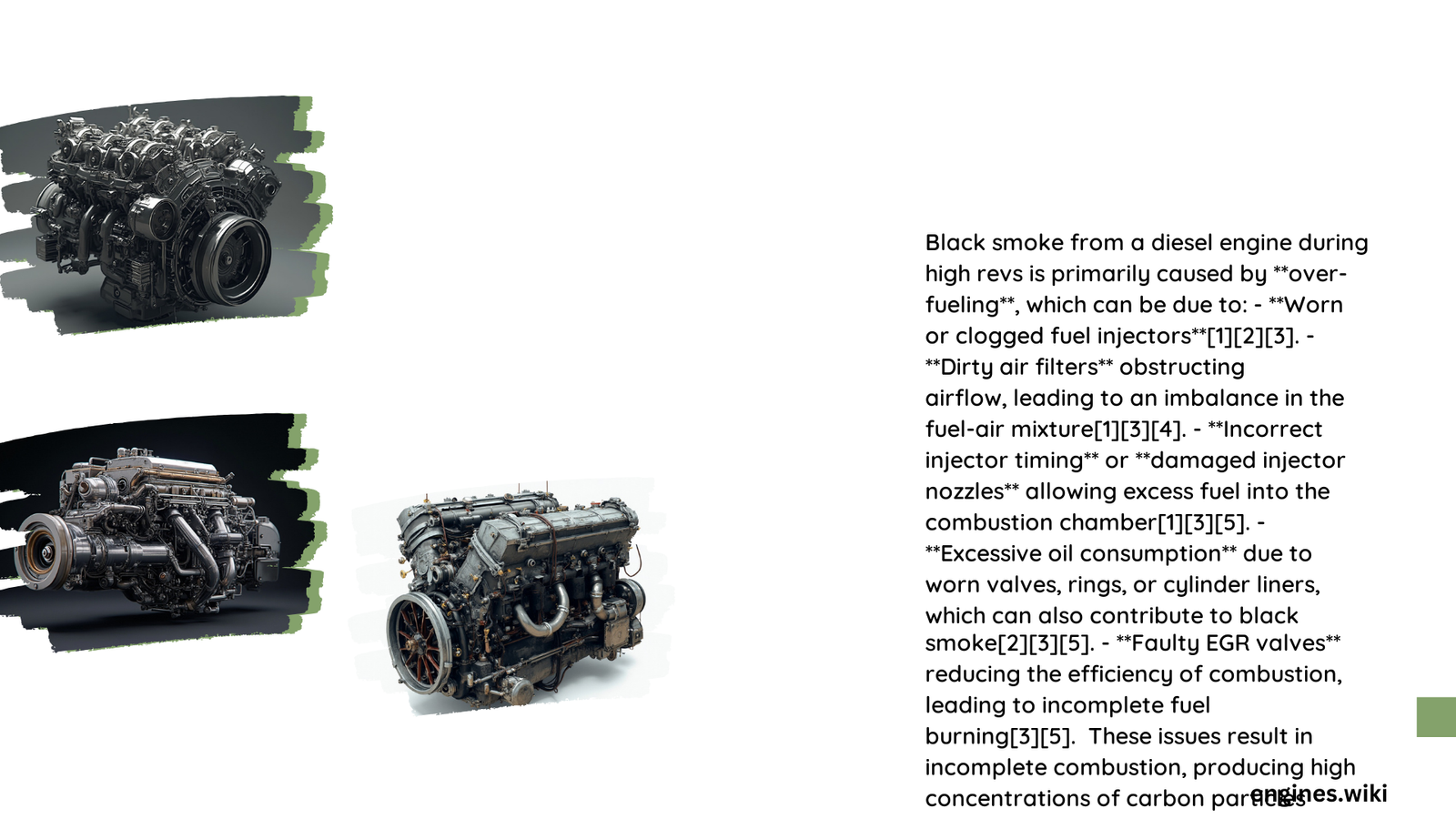Excessive black smoke from a diesel engine at high RPM is a common issue that can indicate various problems. This phenomenon often results from an imbalanced fuel-to-air ratio, caused by factors such as faulty fuel injectors, dirty air filters, or issues with the engine’s combustion process. Understanding the causes, diagnostic procedures, and potential fixes for black smoke at high revs is crucial for maintaining optimal diesel engine performance and efficiency.
What Causes Black Smoke in Diesel Engines at High RPM?
Black smoke from a diesel engine, especially at high revs, is primarily caused by incomplete combustion of fuel. This can occur due to several factors:
-
Imbalanced Fuel-to-Air Ratio: When there’s too much fuel or not enough air in the combustion chamber, it results in unburned fuel particles being expelled as black smoke.
-
Faulty Fuel Injectors: Worn or clogged injectors can lead to over-fueling, causing a rich mixture and increased particulate emissions.
-
Clogged Air Filters: Restricted airflow due to dirty air filters can cause a rich fuel mixture, leading to black smoke.
-
EGR System Issues: A malfunctioning Exhaust Gas Recirculation (EGR) system can contribute to black smoke production.
-
Engine Wear: Worn piston rings or valve seals can allow oil to enter the combustion chamber, resulting in blue-black smoke.
How to Diagnose the Cause of Black Smoke at High Revs?

To accurately diagnose the cause of black smoke in a diesel engine at high revs, follow these steps:
- Visual Inspection:
- Check for visible leaks or damage to fuel lines and injectors
-
Inspect the air filter for excessive dirt or clogging
-
Fuel System Check:
- Test fuel pressure and flow
-
Inspect fuel injectors for wear or clogging
-
Air Intake System Evaluation:
- Examine the air filter and intake manifold for restrictions
-
Check the turbocharger (if equipped) for proper operation
-
EGR System Inspection:
- Verify EGR valve operation
-
Check for carbon buildup in the EGR system
-
Engine Compression Test:
- Perform a compression test to check for worn piston rings or valves
What Are the Specific Fixes for Black Smoke at High RPM?
Depending on the diagnosis, the following fixes can address black smoke issues:
- Fuel Injector Maintenance:
- Clean or replace clogged injectors
-
Adjust injector timing if necessary
-
Air Filter Replacement:
-
Install a new air filter to ensure proper airflow
-
EGR System Repair:
- Clean or replace the EGR valve
-
Remove carbon deposits from the EGR system
-
Engine Repair:
- Replace worn piston rings or valve seals
-
Perform necessary engine overhaul if wear is extensive
-
Fuel Quality Improvement:
- Use high-quality, low-sulfur diesel fuel
- Add fuel system cleaners periodically
How Can Black Smoke at High Revs Be Prevented?
Preventing black smoke involves regular maintenance and good driving habits:
- Regular Maintenance Schedule:
- Follow manufacturer-recommended service intervals
-
Replace air and fuel filters as specified
-
Fuel System Care:
- Use high-quality diesel fuel
-
Add fuel system cleaners periodically
-
Proper Driving Techniques:
- Avoid prolonged idling
-
Gradually accelerate to reduce strain on the engine
-
Regular Inspections:
- Perform visual checks of the engine and exhaust system
- Address any issues promptly to prevent further damage
What Are the Long-Term Effects of Ignoring Black Smoke?
Ignoring black smoke can lead to several serious consequences:
-
Reduced Fuel Efficiency: Incomplete combustion wastes fuel, increasing operating costs.
-
Increased Emissions: Black smoke indicates higher levels of particulate matter, potentially violating emission standards.
-
Engine Damage: Prolonged issues can lead to carbon buildup, reduced engine life, and costly repairs.
-
Performance Degradation: Engine power and responsiveness may decrease over time.
-
Environmental Impact: Excessive emissions contribute to air pollution and environmental degradation.
How Do Environmental Factors Affect Black Smoke Production?
Environmental conditions can influence black smoke production in diesel engines:
| Factor | Effect on Black Smoke |
|---|---|
| Altitude | Higher altitudes can lead to incomplete combustion due to lower oxygen levels |
| Temperature | Cold temperatures may cause incomplete fuel atomization, increasing smoke |
| Humidity | High humidity can affect air-fuel mixture, potentially increasing smoke |
What Are the Legal Implications of Excessive Black Smoke?
Excessive black smoke from diesel engines can have legal consequences:
-
Emission Violations: Many jurisdictions have strict emission standards for diesel vehicles.
-
Fines and Penalties: Vehicles producing excessive smoke may be subject to fines or forced off the road.
-
Inspection Failures: Excessive smoke can cause vehicles to fail mandatory inspections.
-
Environmental Regulations: Businesses operating diesel equipment may face regulatory action for non-compliance.
By understanding the causes, fixes, and prevention methods for black smoke in diesel engines at high revs, owners and operators can maintain their vehicles more effectively, ensuring optimal performance, efficiency, and compliance with environmental regulations.
References:
1. Lubrizol360: Black Smoke Cause Impact and Prevention
2. UTI: Black Smoke from Diesel Engine Causes and Fixes
3. Motor Company Leicester: What Causes Black Smoke from Diesel Engine?
